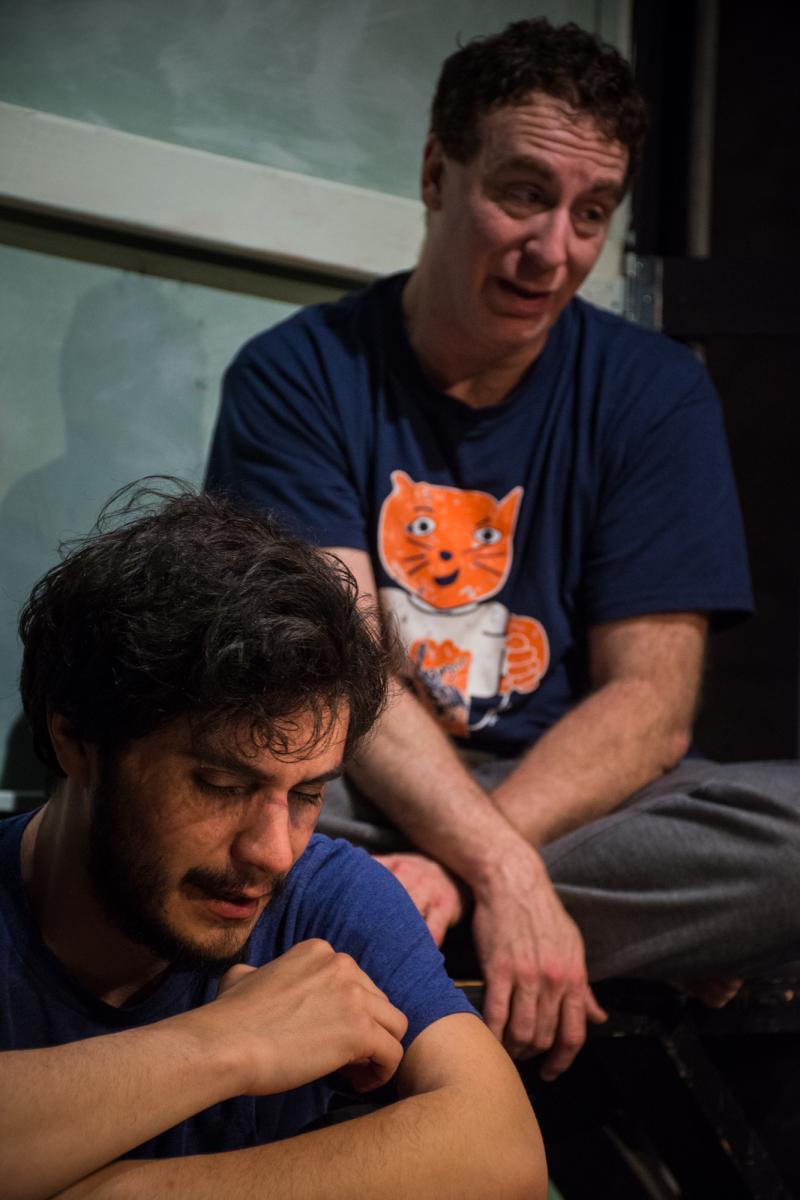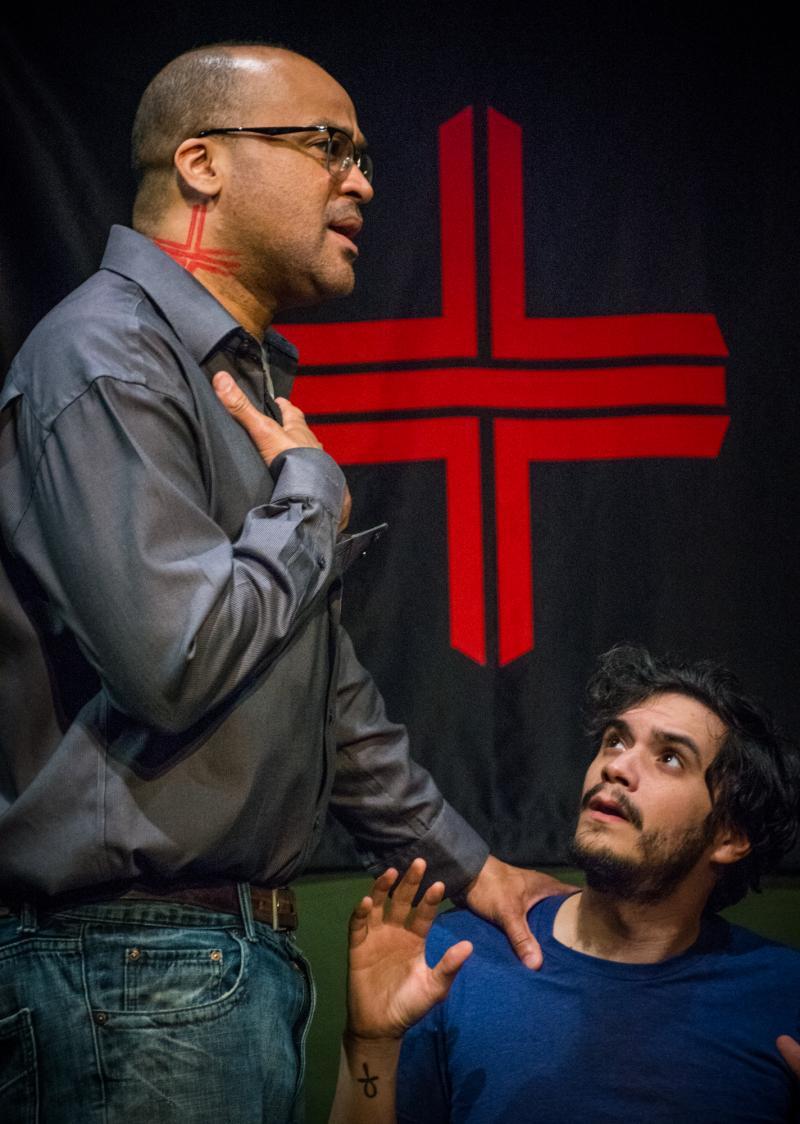Review: ACT 1's Bleak Midwinter of Martin McDonagh's THE PILLOWMAN

Bleak and darkly menacing, playwright Martin McDonagh's view of the world in his blackest of black comedies The Pillowman focuses on the investigation into a series of child murders in a fictional totalitarian state sometime in the near future - or, given the political climate in this real country in which we finds ourselves existing right now, it could well be representative of a parallel universe of which we will learn in the next few weeks or even moments.
Now onstage in a superbly acted production for ACT 1, as part of its 2017-18 season at Nashville's Darkhorse Theater, The Pillowman is directed by Kurt Jarvis, whose staging of The Motherfucker With the Hat last season for Shawn Whitsell's Destiny Theatre Experience was likewise performed by an ensemble of notable local actors.

Jarvis' approach to McDonagh's critically acclaimed black comedy provides his actors with the opportunity to do what they do best, surrounding them with an aesthetic for the play that is apropos to the material, creating a sense of foreboding that permeates the theater from the moment one enters. Set design, created by Todd Seage and Mary Hankins, takes audiences into an interrogation room/detectives' bullpen that provides an ideal setting for an interview of writer Katurian Katurian (whose "funny" parents also gave him the middle name of "Katurian," being the madcaps they were), who is suspected in a trio of graphically detailed murders of young children whose deaths came with disturbing similarities to stories created by Katurian, primarily for his own enjoyment given that only one has been published.
Katurian's stories provide the basis for much of The Pillowman, showing off McDonagh's fascination with fairy tales fractured and twisted to be far more dire and depressing than anything The Brothers Grimm may have jotted down back in the day. And these stories have apparently inspired Katurian's brain-damaged older brother Michal to bring them to life in ways that spell doom and gloom for the Brothers Katurian amid the oppression of the police state and omnipresence of unseen eyes watching their antics.

Jarvis' ensemble relates the tale with some style, focusing on the literature of the play and its sometime far-fetched situations to create a world made more frightening by how closely it mirrors the world in which we live, rather than any fictional and theatrical license to add to its appeal. The world crafted by McDonagh is dreary and depressing, to be sure, and each of his characters are rightfully wounded by it, giving the piece far more gravitas than might be expected.
Diego Gomez is ideally cast as Katurian, delivering his lines with conviction and playing him with a conviction that renders him startlingly authentic. His responses to the play's most glaringly theatrical conceits are pitch-perfect, and he shows a tenderness in scenes with his brother Michal (played with a deft blend of bravery and abandon by Jason Lewis, who adds another starry role to his already lengthy resume) that appeals to the average audience member. Further, Gomez often breaks the fourth wall to speak directly to his audience with confidence and a storytelling style that is impressive.
Lewis' turn as Michal is by far the showiest among McDonagh's quartet of Pillowman characters, and while he walks a very fine line, he manages to ably skirt the tendency to go over-the-top. Instead, Michal is believable and genuine (and wildly funny when need be).

As the detectives meting out justice in the time-honored good cop/bad cop manner (and it's very difficult to determine which is whom) are Taylor James Foster as Tupolski and Chilton Stewart as Ariel, both of whom deliver the theatrical goods. Foster is very mannered as Tupolski - and both oddly chilling and amusingly droll - and makes the most of McDonagh's script to deliver a memorable performance. Stewart, on the other hand, gives a more relaxed, even if somehow more brittle, characterization of Ariel, who has his own fair share of secrets to hide throughout the course of his investigation.
The four actors are charged with the responsibility of creating a palpable sense of repression that would be prevalent while living under a totalitarian regime and they do so seamlessly and rather gracefully (although Gomez's fight choreography is nothing more than a lot of pulled punches that never seem to connect, unlike the dialogue), rather than taking the easier route in the process. Jarvis keeps the action moving at a fairly good pace, even while allowing his actors to take some significant pauses for dramatic effect.
Still, McDonagh's play runs well over three hours, which can be daunting (regardless of the material playing out onstage before you: the script is well-written, the situations thoroughly provocative and believable), but judicious editing of some repetitive elements wouldn't hurt, were it not for the fact that The Pillowman already has proven a sucess and McDonagh's not going to listen to, nor respond to, my admonitions. If there is anything audiences should be warned about, it is indeed the show's length (and perhaps the liberal use of profanities, if you're easily offended by that kind of stuff), with the added caveat to make certain you make use of the WC during the play's two intermissions. And if you grow squeamish at graphic descriptions of the grisly, harrowing and horrific murders of pre-pubescent children, chances are you won't be queueing up for tickets anyway.
The Pillowman. By Martin McDonagh. Directed by Kurt Jarvis. Presented by ACT 1, at Darkhorse Theater, 4610 Charlotte Avenue, Nashville. Through March 17. For details, go to www.ACT1Online.com. Running time: 3 hours, 30 minutes (with two 10-minute intermissions).
photos by Eric Ventress
Reader Reviews

Videos

